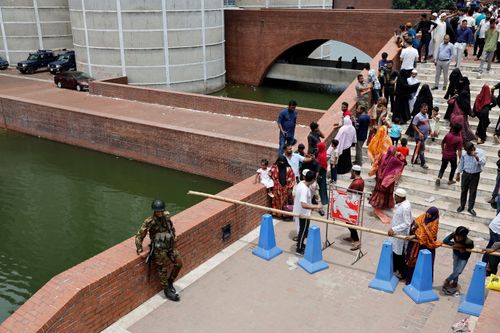
Mamata Banerjee Urges Muhammad Yunus to Restore Peace in Bangladesh
West Bengal’s Chief Minister Mamata Banerjee recently made headlines by urging Nobel laureate Muhammad Yunus to play a role in restoring peace in Bangladesh. This appeal is significant not only because of the deep historical and cultural ties between West Bengal and Bangladesh but also because it underscores Mamata’s commitment to regional stability and her influence as a political leader in the subcontinent. This essay delves into the context of her appeal, the role of Muhammad Yunus, the political dynamics in Bangladesh, and the potential impact of such an intervention.
Table of Contents
The Context: Rising Tensions in Bangladesh
Bangladesh, a nation with a rich history of struggle for independence and rapid economic growth, has faced political and social unrest in recent years. Tensions have been mounting due to political conflicts, economic challenges, and incidents of communal violence. The government, led by the Awami League under Prime Minister Sheikh Hasina, has faced criticism from opposition parties and civil society for its handling of these issues. Accusations of human rights violations, suppression of dissent, and the erosion of democratic processes have further exacerbated the situation.
The unrest has had repercussions beyond Bangladesh’s borders, particularly in West Bengal, which shares a long and porous border with the country. Any instability in Bangladesh can have direct consequences for West Bengal, including potential refugee flows, cross-border smuggling, and communal tensions. It is within this context that Mamata Banerjee’s appeal to Muhammad Yunus becomes particularly relevant.
Muhammad Yunus: A Symbol of Peace and Development
Muhammad Yunus, a globally respected figure, is best known for founding Grameen Bank and pioneering microfinance, which has lifted millions out of poverty. His work earned him the Nobel Peace Prize in 2006, making him an iconic figure in Bangladesh and beyond. Yunus represents a different vision for Bangladesh—a vision rooted in social entrepreneurship, empowerment of the poor, and peaceful development.
Mamata Banerjee’s appeal to Yunus is strategic. By calling on a figure of his stature, she is emphasizing the need for non-political, grassroots-driven approaches to peacebuilding in Bangladesh. Yunus, with his moral authority and international recognition, is well-positioned to mediate and encourage dialogue among different factions in Bangladesh. His influence could help foster a climate of cooperation and understanding, which is crucial for addressing the underlying issues fueling the unrest.
Political Dynamics in Bangladesh
Bangladesh’s political landscape is currently dominated by two major parties: the ruling Awami League and the opposition Bangladesh Nationalist Party (BNP). The rivalry between these parties has often led to political violence, strikes, and widespread unrest. The situation has been further complicated by the rise of extremist groups, which have occasionally exploited the political instability to further their own agendas.
The current government, led by Sheikh Hasina, has been credited with significant economic progress, but it has also been accused of authoritarian tendencies. Critics argue that the government has stifled dissent, undermined democratic institutions, and used security forces to silence opposition. This has led to a polarized society, where political discourse is often fraught with tension and violence.
In this environment, a call for peace and dialogue is both timely and necessary. Mamata Banerjee’s appeal to Yunus is a recognition of the need for a broader, more inclusive approach to resolving Bangladesh’s political crisis—one that goes beyond the traditional power struggles between the Awami League and the BNP.
Mamata Banerjee’s Regional Influence
Mamata Banerjee’s involvement in regional issues is not new. As the Chief Minister of West Bengal, she has always maintained a keen interest in the affairs of Bangladesh. Her state’s proximity to Bangladesh and the shared cultural and linguistic heritage between the two regions give her a unique perspective on the challenges facing the neighboring country.
Mamata has often positioned herself as a leader who is not just concerned with the internal affairs of her state but also with the broader issues affecting the region. Her appeal to Muhammad Yunus can be seen as part of her broader strategy to ensure stability and peace in the subcontinent, which she believes is crucial for the well-being of West Bengal.
Moreover, Mamata’s appeal highlights her political acumen. By reaching out to Yunus, she is positioning herself as a mediator who can bridge the gap between different political and social factions in Bangladesh. This move could also enhance her stature as a leader with influence beyond India’s borders, reinforcing her image as a stateswoman concerned with regional peace and development.
The Potential Impact of Yunus’s Involvement
If Muhammad Yunus were to take up Mamata Banerjee’s call, it could have a significant impact on Bangladesh’s political climate. Yunus’s involvement could encourage a more peaceful and constructive dialogue between the government and opposition forces. His presence could also inspire confidence among civil society groups and the general population, who may feel disillusioned with the current political environment.
Moreover, Yunus’s emphasis on social entrepreneurship and economic empowerment could offer a pathway to addressing some of the socio-economic issues underlying the unrest. By promoting inclusive development and economic justice, Yunus could help mitigate some of the grievances that have fueled political instability in Bangladesh.
Conclusion
Mamata Banerjee’s appeal to Muhammad Yunus to restore peace in Bangladesh is a reflection of her deep concern for regional stability and her recognition of the interconnectedness of West Bengal and Bangladesh. By calling on a respected figure like Yunus, Mamata is advocating for a peaceful, non-partisan approach to resolving the political and social unrest in Bangladesh. If successful, this intervention could not only bring peace to Bangladesh but also strengthen Mamata’s standing as a leader with regional and international influence.







